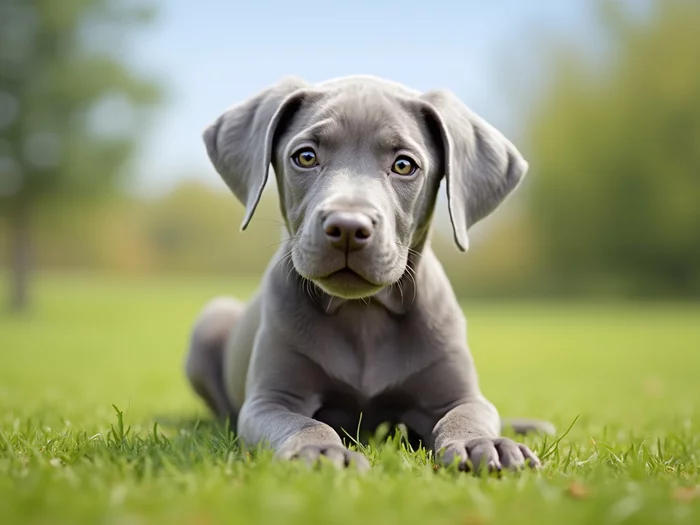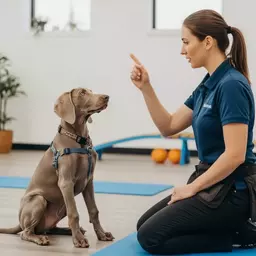Breed Characteristics
- • High Energy Levels
- • Quick Intelligence
- • Strong Prey Drive
Get the latest tips on Weimaraner care, ethical breeding, and puppy training delivered straight to your inbox.
Posted on: 2025-10-04
By: Cameron F. McAllister
Training a Weimaraner puppy can be a rewarding yet challenging experience. To set your new furry friend up for success, understanding their unique traits and training needs is essential. Here are some key insights to keep in mind as you embark on this journey.
This visual summarizes the crucial elements impacting Weimaraner puppy training, focusing on breed characteristics, temperament, and the foundational aspects of consistency and patience.
Welcoming a Weimaraner puppy into your home is an exciting journey filled with joy and discovery! As a passionate dog enthusiast, I’m thrilled to share the key traits and unique training needs of this remarkable breed. Weimaraners are known for their intelligence, energy, and strong hunting instincts, all of which can greatly influence your training approach.
Recognizing these characteristics early on can help you tailor your training methods effectively. For example, understanding their high energy levels means you'll need to incorporate plenty of physical activity into their daily routine. Let's dive into some of the essential traits that will help you successfully train your Weimaraner puppy!
When it comes to training Weimaraner puppies, it's crucial to consider the breed's specific characteristics that can impact their learning. Here are some of the key traits to keep in mind:
By understanding these traits, you can better cater your training sessions to fit their needs. For instance, incorporating interactive games can stimulate their minds while also teaching them important commands.
The temperament of Weimaraners is another factor that plays a pivotal role in their training. These dogs are known for being loyal, affectionate, and sometimes a bit stubborn! Establishing a strong bond with your puppy is key to effective training. They thrive in an environment filled with positive reinforcement and love.
To foster an effective training atmosphere, consider these aspects of their temperament:
By understanding and embracing their temperament, you can create a loving and structured environment that encourages learning and growth.
Training your Weimaraner puppy should begin as early as possible! Early training not only helps set the foundation for good behavior but also aids in building a confident and well-adjusted adult dog. Starting young allows you to shape their behavior effectively while they are still impressionable. According to Texas A&M University's College of Veterinary Medicine & Biomedical Sciences, early socialization and training are crucial for Weimaraner puppies.
Here are some key reasons why early training is crucial:
So, let’s make the most of those early weeks together—your Weimaraner will thank you for it in the long run!
We want to hear from you! What has been your biggest challenge in training your Weimaraner puppy? Share your thoughts below:
Weimaraner puppies possess high energy levels, quick intelligence, and a strong prey drive. These traits mean they require regular exercise, consistent engagement in training, and specific recall training to manage their hunting instincts.
Weimaraners are affectionate, protective, and naturally curious. Their affectionate nature makes socialization important, their protective instincts highlight the need for early exposure to strangers, and their curiosity means they enjoy learning new things, which can be leveraged in training.
Early training is crucial because puppies are highly impressionable and absorb information easily. It helps establish good behavior, reduces future behavioral issues like excessive barking, and builds a strong bond and trust between the puppy and owner.
Consistency in commands and routines creates a stable learning environment, helping your puppy understand expectations. Patience is vital because every puppy learns at its own pace. A calm demeanor and positive reinforcement motivate your puppy to continue learning, even when challenges arise.
Effective techniques include positive reinforcement (treats, affection), clicker training for immediate feedback, practicing commands in various environments to generalize learning, and observing your puppy’s body language to gauge their comfort and understanding.
When it comes to training your Weimaraner puppy, consistency is crucial! Establishing a routine not only helps your puppy understand what you expect but also builds their confidence. As a first-time dog owner, you might be eager to see results, but remember that every puppy learns at their own pace. Let's explore how you can maintain consistency and patience in your training journey.
One way to foster consistency is by using the same commands for specific actions. For instance, if you're teaching your puppy to sit, stick with "sit" every time. This clarity helps your puppy connect the command with the desired action. Additionally, having a training routine—like practicing commands after meals or during playtime—will reinforce learning. The Weimaraner Club of America emphasizes the importance of consistent training for this intelligent breed.
Consistency in commands and routines creates a stable learning environment for your Weimaraner. Here are some practical tips:
By following these steps, you can help your puppy grasp concepts more quickly and feel secure in their learning environment. Remember, patience is just as important as consistency!
Training a Weimaraner puppy can be challenging, but maintaining a patient attitude is essential for success. If your puppy struggles to grasp a command, don’t lose heart! They are still learning, and your calm demeanor will encourage them to keep trying.
When you exhibit patience, it sets a positive tone for your training sessions. Celebrate small victories, like when your puppy correctly follows a command for the first time. This positive reinforcement will motivate them to continue learning. Consider incorporating the following practices:
To achieve long-lasting results, use techniques that cultivate behavioral consistency. Here are some effective strategies:
By using these techniques, you’ll not only help your Weimaraner puppy learn but also build a solid foundation for a strong relationship. The journey of training is filled with ups and downs, but with patience and consistency, you’ll pave the way for a well-behaved and happy companion!
As we wrap up this section on training, let’s recap the key points that will set you up for success with your Weimaraner puppy. Remember, training is a continuous journey, and adapting your methods based on your puppy's progress is essential.
Keeping these elements in mind will help you navigate the training landscape with confidence. Always remember that your puppy looks to you for guidance!
Training doesn’t stop once your puppy learns the basics. It’s important to continue introducing new commands and behaviors as they grow. Adaptability in your training approach ensures that you remain responsive to your puppy’s changing needs and abilities.
Consider joining a local training class or exploring online resources for fresh ideas and techniques to keep your training journey exciting. As you adapt and grow alongside your Weimaraner, you’ll foster a deeper bond and understanding of each other.
Finally, celebrate your puppy’s milestones! Recognizing achievements, no matter how small, can keep both you and your puppy motivated. Track their progress and acknowledge their growth—this will encourage positive behavior and a healthy training relationship.
At Best Weimaraner Puppies, we believe that every step of the training journey is a valuable experience. So, enjoy each moment with your furry friend and watch as they blossom into a well-mannered companion! Together, with consistency and patience, you’ll create a loving environment for your Weimaraner to thrive.
Here is a quick recap of the important points discussed in the article:

 Choosing to train your Weimaraner puppy is not just about obedience; it’s about forging a lifelong
Choosing to train your Weimaraner puppy is not just about obedience; it’s about forging a lifelong
 Choosing a reputable breeder is essential for ensuring a healthy, happy Weimaraner puppy. Here are k
Choosing a reputable breeder is essential for ensuring a healthy, happy Weimaraner puppy. Here are k
 Training your Weimaraner is not just about commands; it’s a journey of companionship and understan
Training your Weimaraner is not just about commands; it’s a journey of companionship and understan